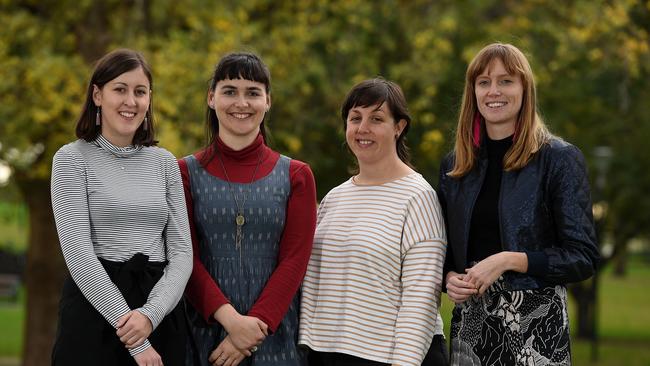Call for ‘menstrual leave’ by young women may be a bombshell but hardly outrageous
YOUNG women have staked an unapologetic claim for a day-a-month to work at home if suffering strong pain. It makes sense, writes Wendy Tuohy.

Wendy Tuohy
Don't miss out on the headlines from Wendy Tuohy. Followed categories will be added to My News.
MOST campaigns to boost women’s workforce engagement take a softly-softly, data-driven line, but the Victorian Women’s Trust call for women to be paid period leave is a bombshell.
It is unapologetic and brazen and has the potential to be a big catalyst for debate around women’s status at work.
What the trust is proposing is hardly outrageous, though a backlash is guaranteed.
It wants employers to allow women who suffer strong menstrual pain to be permitted to do a day a month at home, or take a day off on the worst months, or occasionally work in a more comfortable position in the office than upright at a desk in tight clothes. It is much less arduous for employers than Italian menstrual leave laws introduced this month, which mandate that women may have up to three days’ paid leave off a month if necessary.
The trust, an independent advocacy body and one of the oldest women’s funds in the world, wants taboos around the natural rhythm of the female body exploded and the stigma removed.
The young women who drafted this no longer want the menstrual cycle to be considered “a sickness” or something shameful that needs to be hidden.
They don’t want women having to lie on days they can’t come in — which for most are rare occasions if they happen at all.
The maximum cost to employers will be 12 days a year of leave for women with the worst monthly disruption, though the women who wrote the policy believe it is highly unlikely many would need to use the whole 12 days off work.

They also doubt, as do I, that any trust-based entitlement such as this would be rorted. If you’re up to rip off a system that relies on personal integrity, you are very likely doing other dodgy stuff at work that is likely to put your job in jeopardy.
With constant headlines this year about child and forced marriage, female genital mutilation and escalating death tolls from family violence and violence against women in our community, of course the policy’s authors will be accused by critics of focusing “on trivia” when bigger women’s health and safety issues matter more.
They are not arguing this issue is more important or comparable with other issues regarding women’s rights, health and safety here or in other countries where women are living in horrendous deprivation.
But they make a strong case that anything that can be done to help level the playing field for women here and now is worth raising.
The data projections of a huge benefit for the Australian GDP if we can get more women working and remaining in, or returning to work is indisputable. But real progress toward a gender-blind employment culture has been excruciatingly slow.
One reason is that entrenched biases and norms skewed toward “traditional” male work patterns and practices are proving extremely difficult to disrupt.
What some who will attack this proposal as an indulgence may not accept is that workplaces which become more in tune with and supportive of employees are going to attract and retain talent, generate high levels of loyalty and, most importantly, be better workplaces for everyone there, not just women.
Plenty of research has shown that employees who feel valued and respected go beyond their job description and achieve high productivity.
A great side-effect of the debate around making workplaces more women-friendly is that many have introduced policies allowing men to live much fuller family lives, and lives generally as well.
More flexibility and more acknowledgment that if you trust employees, treat them as whole people and not as expendables to burn up, and bother to build a strong two-way relationship with them it shows in the bottom line are creeping into the way successful Australian companies work.
The gender pay gap may be stuck at around 17 per cent (statistically proven despite what its deniers may claim), there may still be far too few women in influential roles and the chronic shortage of available and affordable childcare may still exist — and let’s not even start on the dithering over paid parental leave policies — but more big employers are at least paying lip service to a commitment to encourage diversity.
They have worked out it’s good for business.
The “menstrual policy” proposal will be very confronting to people who have done best under the stale old models.
But given those models are already needing drastic reform, it’s time to revisit the whole picture of how we work, whether it feels comfortable for the old guard or not.
This proposal will shake up debate about how to get the best out of all of us at work of it’s well-worn tracks — and for that it’s a ballsy stroke of genius.


